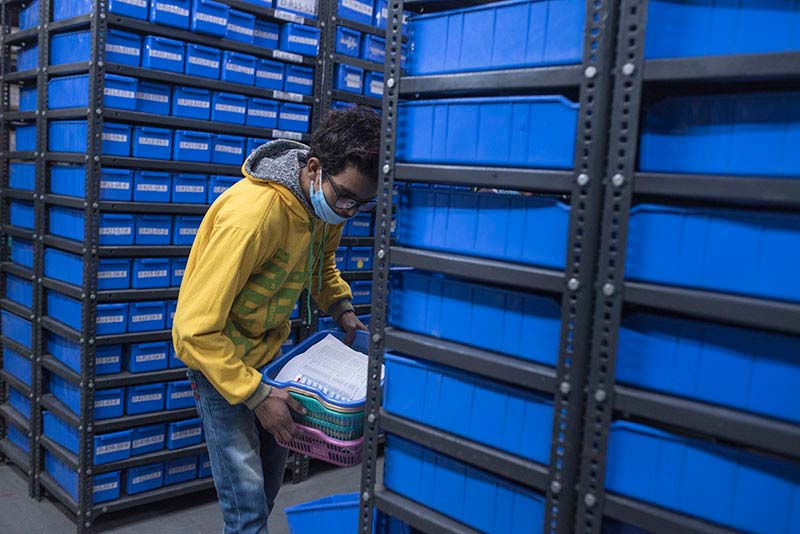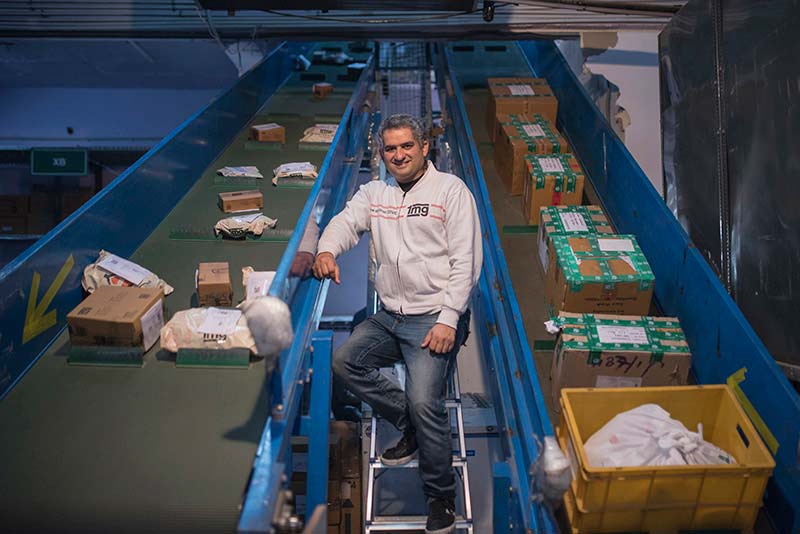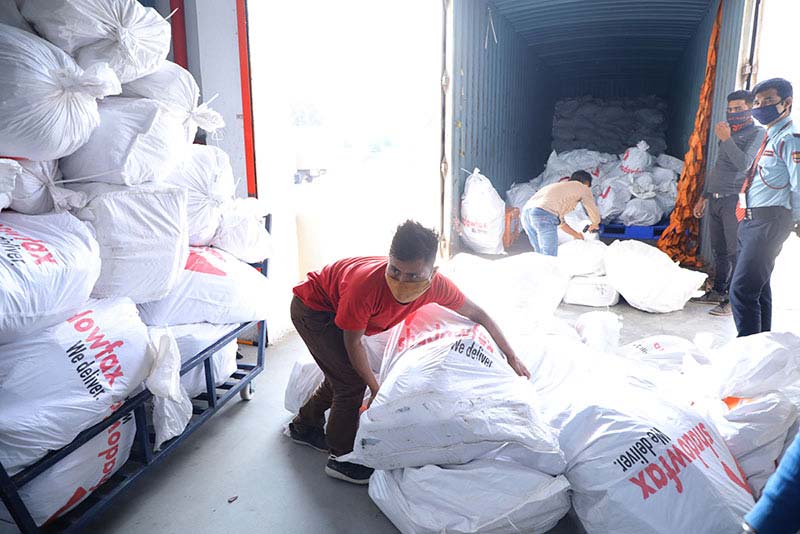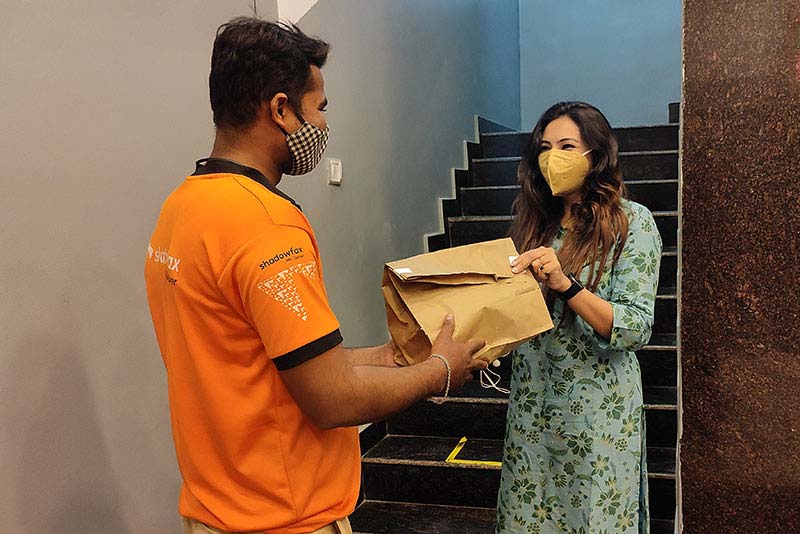By Alison Buckholtz
Tech entrepreneur Prashant Tandon isn’t wasting any time. The company he founded in 2015, Delhi-based digital health platform 1mg, has been in “mission mode” since the pandemic struck India, he said, because creating fast, safe, and reliable supply chains for the COVID-19 vaccine and other pharmaceuticals will contribute significantly to the nation’s economic recovery.
Tandon’s vision is to scale up its COVID-19 response to reach as many of India’s 1.3 billion people as possible—especially those in remote regions who are traditionally underserved. To do this, the company is mainstreaming technology into logistics operations to better track, monitor, and deliver vaccines, medicines, and health products.
“Right now, there’s almost no traceability,” Tandon said. “Things like soap and matchboxes have bar codes, but not medicines. When it comes to something as important as vaccines, we need an entirely traceable supply chain so we can be confident and comfortable.”

Pharmaceuticals and health products from 1mg now reach about 2,500 cities across India. Photo by: Aditya Kapoor/JDot
In South Asia, the virus has already had a devastating impact on the economy, leading to an estimated output contraction of 6.7 percent in 2020, according to the World Bank’s latest forecast. The impact has been particularly pronounced in India, where 2020 GDP growth estimates indicate a contraction of 9.6 percent. Safe, rapid vaccine deployment is key to a resilient economic recovery.
But the distribution demands prompted by COVID-19, especially for last-mile delivery, won’t disappear after the virus has been contained, or even after the economy has regained its footing, Tandon said. The need to rethink core strategies related to India’s supply chain is critical because this is “a significant and important disruption in the logistics sector, not a one-time spike,” he noted.
As with 1mg, an IFC investee, other start-ups in the region are responding to a world reshaped by the pandemic. “This is the time for logistics companies to reconsider the old ways of doing business” to remain relevant, said Venkatachalam Anbumozhi, a Senior Economist at the Economic Research Institute for ASEAN and East Asia (ERIA), who tracks the resilience of regional value chains in South Asia. “Some drivers of change, such as the digitalization of logistical operations, will be permanent,” he said.
It’s important to pay attention to the prospects presented by such shifts, said Omera Khan, a Professor of Supply Chain Management at Royal Holloway, University of London.
“If the pandemic was an instructive object lesson in supply disruption, it was also an instructive object lesson in resilience,” she said. “To survive this period and protect ourselves from the next crisis, we’re moving from globalization to regionalization, and there’s now a real opportunity for local logistics networks to compete in local markets.”
Cultivating resilience
When the pandemic struck India, the health-care service delivery industry was designated an essential sector—among the few services allowed to operate during lockdowns.
“We had the expectation of the whole society on us,” Tandon remembered. “We had to make decisions very deliberately to get ready to meet the overwhelming need that COVID-19 presented. There was a huge opportunity for us, but it was also a challenge that nobody was particularly ready for.”

Prashant Tandon, CEO of 1mg, at a company warehouse in New Delhi. Photo by: Aditya Kapoor/JDot
To meet that challenge, 1mg struck several collaboration agreements with competitors. “Our mantra is ‘Partnerships,’” Tandon said. The new alliances have positioned the company to distribute and administer the COVID-19 vaccine to 50 cities in India; Tandon estimates that 1mg’s network of health-care workers will eventually be able to vaccinate 500,000 to 1 million people per day. Extending the reach of 1mg’s logistics network to last-mile communities is a priority, according to Tandon.
Logistics companies throughout India are also pursuing partnerships to accelerate the delivery of vaccines, medicines, and essentials like groceries where they’re needed most. Shadowfax, an IFC investee that launched six years ago as a logistics platform for express, last-mile delivery service, has strengthened its mission to provide ground services support for vaccine transportation. This will be aided by cold chain operations already in place—in the form of refrigerated vehicles for vaccine delivery—and a recent collaboration with SpiceXPress for express cargo movement.
“It is vital to have the right partnership when undertaking a task this critical,” said Rahul Kumar, Head of Network Partnerships at Shadowfax.
Partnerships that are created among logistics competitors are a fairly new development, but the trend reflects recent research from DHL and McKinsey asserting that “supply chain innovation will be essential and collaboration along the value chain will be the enabler for future business success.” That innovation includes the integration of different supply chain services and partners, because the successful and safe administration of a vaccine includes many components.

A Shadowfax employee unloads a truck in the Bengaluru delivery center. Photo: Courtesy of Shadowfax
Warehousing is one of those components. To expand temperature-controlled storage capacity for COVID-19 vaccines in India, IndoSpace, an IFC investee that invests in, develops, and manages industrial real estate and warehousing, partnered with KoolEx in late 2020. The alliance will help IndoSpace build three temperature-controlled pharmaceutical distribution centers across India. The first one to open, near Mumbai, will be India’s largest stand-alone temperature-controlled warehousing facility.
“Warehousing and the logistics industry will play a major role in COVID-19 inoculation programs, and by extension in rebuilding India’s economy,” said Rajesh Jaggi, Vice Chairman for Real Estate at Everstone Capital, part of the IndoSpace leadership team. “The warehousing and logistics sector has been one of the most resilient sectors of the Indian economy during the COVID-19 crisis because of its ability to quickly adapt to new demand for last-mile services.”
Logistics in the limelight
Although COVID-19 lays bare the need for secure supply chains—and especially for cold chains that can transport and store vaccines at low temperatures—1mg’s Tandon said that funding for logistics businesses hasn’t come fast enough to match the need. “Even though logistics is in the limelight, as a sector it is underdeveloped and underinvested,” he said.

The Shadowfax network fulfilled 18 million pharmaceutical, grocery, and food delivery orders during India’s lockdowns. Photo: Courtesy of Shadowfax
It may not be underdeveloped and underinvested for long, in part because the Indian government is emphasizing logistics among top-level economic reforms. In 2017, the government created a new logistics division in the Ministry of Commerce and Industry, and it is now nearing completion on a National Logistics Policy that will help lower the cost of logistics.
In India, the logistics cost as a percentage of national GDP is 14 percent, as per a 2020 joint report by Arthur D. Little and the Confederation of Indian Industry. This figure is significantly higher than similar costs in the U.S. (9.5 percent), Germany (8 percent), and Japan (11 percent)—and that’s problematic because high logistics costs hinder global trade and long-term growth.
Innovation in the private sector, including start-ups offering disruptive technologies that strengthen supply chains, “will play an important role in lowering logistics costs,” said Roshika Singh, IFC’s Senior Country Officer for India.
Investors are tuned in to this potential, said Priyanka Kishore, Head of India and Southeast Asia Economics at Oxford Economics, and as a result, funding in Indian logistics start-ups remained on “a strong footing even amid the pandemic.”
Overall, tech companies’ contributions to lowering India’s logistics costs contributes to Oxford Economics’ positive outlook for India’s logistics sector, which is “one of the ten fastest growing ones globally in the coming decade,” Kishore said. “Start-ups will likely play a crucial role in achieving this forecast.”
Published in February 2021
